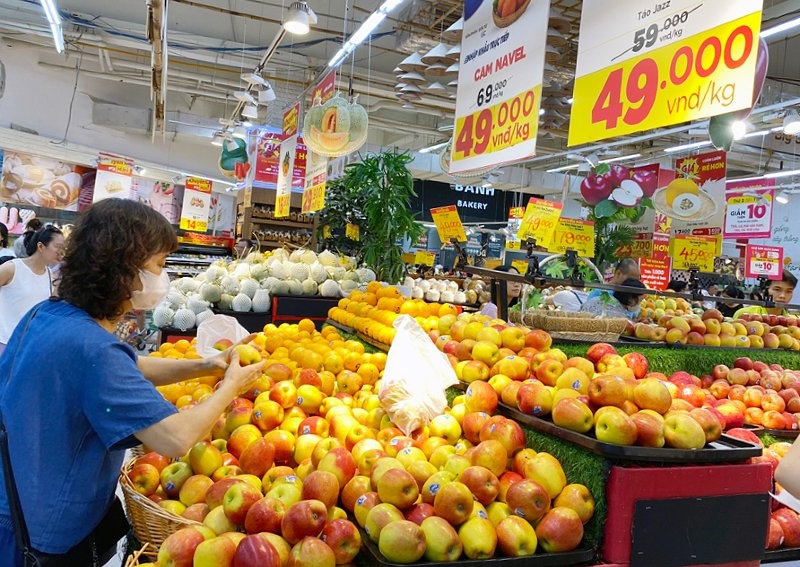Vietnam's FMCG market suffers turbulent year
 |
While Vietnam's 2023 GDP growth of 5.05 per cent fell short of government projections, this growth has been assessed as solid given the prevailing global economic headwinds. The outlook for 2024 is positive, given a rebound in export demand.
However, a positive economic outlook at the end of 2023 failed to boost consumer confidence. Concerns over income and persistent lay-offs continue to hamper confidence.
In addition, concerns over food safety, health, and household income have become an increasing concern for consumers. Uncertainties surrounding Tet bonuses fuel worries about a less prosperous Lunar New Year.
After a slight uptick in Q3, more families faced financial struggles in Q4 2023, accounting for the highest percentage since the pandemic. Concerns about household income and the financial situation are leading factors in the mounting rate of struggling families.
Despite these headwinds, both urban and rural areas have maintained a steady momentum in spending growth over the past two years. Accordingly, FMCG growth in urban areas is primarily driven by increasing prices while FMCG growth in rural areas see higher purchase volume, presenting significant untapped potential for growth.
There is an overall dip in FMCG value growth over the quarters, notably reflected in a steeper volume decline in urban in Q3 despite decelerating price increases. Rural areas show relative resilience in terms of volume growth.
Specifically, the non-food sectors have consistently fuelled FMCG growth throughout the year, particularly in fast-growing personal care categories such as shampoo and sun protection in urban areas. Milk powder is a key growth driver in the dairy sector, which has seen significant price increases.
Price increases may be slowing down, but shoppers are also cutting back on purchase volume. To thrive, FMCG brands must prioritise value propositions, competitive pricing strategies, and targeted value-driven offers.
The report also pointed out the shift in the retail landscape. While traditional trade remains dominant in Vietnam, its contribution to market value is shrinking.
In modern trade, hypermarkets and supermarkets are facing competition from convenience and speciality formats, driven by a growing demand for convenient, targeted shopping experiences. This paradigm shift is evident in both urban and rural areas, with nuances in preferences and store types.
 | Consumption rise uncertain until general recovery appears Vietnamese consumers continue to be mindful of their spending in 2024 in anticipation of the challenging outlook in the short and medium term. |
 | Three key trends shaping consumer industry’s journey towards digital maturity Deloitte's latest report reveals three key trends that encapsulate the forces shaping the consumer industry’s journey towards digital maturity. |
 | Consumer industry more mature thanks to digital efforts Digitalisation of the supply chain has helped consumer businesses shorten the distance with customers and achieve higher results in terms of revenue, profit, and brand reputation. |
What the stars mean:
★ Poor ★ ★ Promising ★★★ Good ★★★★ Very good ★★★★★ Exceptional
 Tag:
Tag:
Related Contents
Latest News
More News
- Temporary relief for food imports as businesses urge overhaul of regulations (February 07, 2026 | 09:00)
- Opella and Long Chau join forces to enhance digestive and bone health (February 06, 2026 | 18:00)
- Vietnam-South Africa strategic partnership boosts business links (February 06, 2026 | 13:28)
- Sun PhuQuoc Airways secures AJW Group support for fleet operations (February 06, 2026 | 13:23)
- Pegasus Tech Ventures steps up Vietnam focus (February 05, 2026 | 17:25)
- The generics industry: unlocking new growth drivers (February 04, 2026 | 17:39)
- Vietnam ready to increase purchases of US goods (February 04, 2026 | 15:55)
- Steel industry faces challenges in 2026 (February 03, 2026 | 17:20)
- State corporations poised to drive 2026 growth (February 03, 2026 | 13:58)
- Why high-tech talent will define Vietnam’s growth (February 02, 2026 | 10:47)






















 Mobile Version
Mobile Version